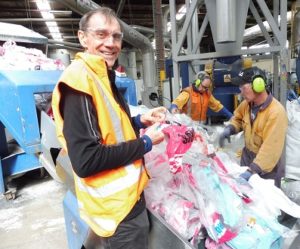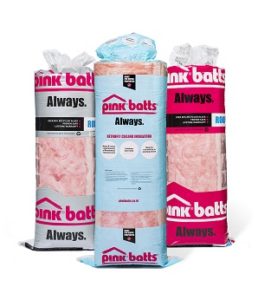21 November 2019 – Convex has pioneered two innovative recycling initiatives this year to minimise the environmental impact of the packaging they produce.
Customers now have more options to recycle their packaging and a process has been developed to recycle blended polyethylene/polyester pouch film, which previously could not be recycled.

Convex Managing Director, Owen Embling, helping sort Pink® Batts® insulation recycling at Astron Sustainability
Convex is now recycling up to 11 tonnes per month of their own mixed polyester factory waste film and have made it possible for customers to incorporate recycled material from their own used packaging into their own new films.
Convex Managing Director, Owen Embling says, “We are constantly looking for opportunities to create a planet-friendly chain of custody for every pack we make, and to help our customers minimise single-use packaging. Where a compostable packaging option is not currently possible or economically viable for a particular packaging application, we work with our customers to find ways to make their packaging recyclable. We are also constantly working to incorporate an increasing percentage of recycled plastic material into our customers’ packaging as supply and technology allows.”
Convex has been actively investing in the development of sustainable packaging options for over 20 years, long before eliminating single-use packaging became a market driver. In 1996, Convex produced their first commercial compostable pack and registered their company re~ recycling logo, which is still in use today. Ever since then, Convex has been pushing the boundaries of sustainable packaging to provide their customers with functional planet-friendly packaging options that suit their requirements and budget.
A Strong Recycling Solution for Pink® Batts® insulation
Working with Convex has allowed Tasman Insulation New Zealand Ltd to find a workable recycling solution for their Pink® Batts® insulation bags.
Because they are packed with highly compressed insulation and are handled and stored on building sites, it was important the bags retained their high strength properties. The solution was to recycle the used high strength bags that Convex had custom-produced for Tasman Insulation and then use a percentage of the recycled resin in the new Pink® Batts® insulation bags.
Pink® Batts® insulation National Marketing Manager, Alison Roberts says, “The compressed insulation puts a lot of pressure on the bags and it’s important they are robust enough to sustain a little rip without bursting open. We did a few experiments using different sorts of plastic and found recycling the bags that Convex developed for us and putting them back in to making our own bags again works really well.”
Convex also worked with Tasman Insulation to make a few adjustments to their bag design to make it more suitable for recycling.
Alison says Convex’s recycling solution has added to the sustainability of Pink® Batts® insulation, which is already made from over 80% recycled glass, and ensured the bags remain fit for purpose.
Convex Creates Reusable Mixed Polyester
Convex has developed a unique recycling process that is on track to redirect at least 100 tonnes of mixed polyester factory waste away from landfill each year.
The previously unrecyclable blended polyethylene/polyester pouch film is now able to be processed into reusable resin by Convex’s recycling partner, Astron Sustainability, and then returned to Convex to incorporate into a range of other products. The proprietary mixed polyester recycling process was developed as part of Convex’s commitment to reduce landfill waste.
Astron Sustainability Business Manager, Steve Mead says, “Polyester and polyethylene are incompatible and the recycled polymer that is produced from blended film is normally not usable for general applications. The solution Convex came up with has made a big difference in the usability of the recycled resin and is a fantastic initiative to help reduce single-use plastic.”
“It’s great that Convex is thinking broadly about the challenges around sustainability and is playing a leading role in exploring new ideas and technologies to increase plastic recycling.”



